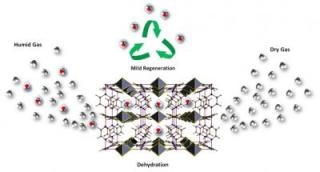May 19 2017
The development of a metal-organic framework (MOF) capable of effectively and selectively adsorbing water to dry gas streams has overturned the traditional assumption that MOFs cannot be stable in water.
 This image shows energy efficient gas drying achieved by a metal-organic framework. (Credit: Copyright 2017 Mohamed Eddaoudi)
This image shows energy efficient gas drying achieved by a metal-organic framework. (Credit: Copyright 2017 Mohamed Eddaoudi)
The achievement of energy efficient dehydration by our MOF is revolutionary.
Professor Mohamed Eddaoudi, Director of the Advanced Membranes and Porous Materials (AMPM), KAUST Division of Physical Science and Engineering
In order to prevent problems including pipeline blockages and corrosion caused by the formation of methane ice, it is essential to dehydrate gases, such as natural gas, before transportation and use. An energy-intensive regeneration cycle is required by standard drying agents.
The KAUST team’s newly developed fluorinated MOF has the potential to attain the drying and regeneration cycle at comparatively low temperatures and needs almost half the energy input of traditional procedures. This dramatic reduction in energy use showcases the apparent potential for upscaling the innovation in order to bring greater efficiency savings in the transport and gas production industry.
MOFs are hybrid organic-inorganic materials comprising of metal ions or clusters held in place by organic molecules called linkers. Varying the organic linkers and metal components allows Researchers to efficiently enhance the chemical properties and structure of MOFs. This fine-tuning is important for developing MOFs with cavities that will selectively bind to and retain particular molecules, such as the water that has to be removed from a gas stream.
Initially, our aim was to adapt our recently introduced fluorine-containing MOFs, to include a periodic array of open metal sites and fluorine centers in the contracted pore system, to achieve various key separations.
Professor Mohamed Eddaoudi, Director of the Advanced Membranes and Porous Materials (AMPM), KAUST Division of Physical Science and Engineering
This exploration results in the discovery of a water-stable MOF, presently labeled KAUST-8, with outstanding recyclable dehydration capabilities and unique water adsorption properties. KAUST-8 significantly removes carbon dioxide along with water, which is a regular requirement in industrial gas processing.
"I have no doubt that this discovery will inspire scientists in academia and industry to explore MOFs to address other challenges," said Eddaoudi. The KAUST team feels that additional possibilities could include the removal of water from liquids, such as solvents and inks used in the electronics industry.